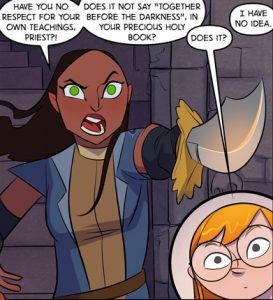(Look, I know my post titles suck, but I really like overcomplicated alliterations.)
One of the major issues that has been plaguing roleplayers for years is the difference between a player’s own charisma and their character’s supposedly better charisma. In extreme cases, it might seem to be a hard limit on the game: A closed-off, quiet and shy person seems to be “unable” to play a verbose, colorful, outspoken bard.
This discrepancy between the player’s skills and their character skills also occasionally pops-up when a player is trying to play a character who’s super-intelligent, but let’s keep this discussion for some other time. You might also see some similarities to the player-character knowledge gap I’ve talked about before.
A Solvable Issue
Now, you can say “Well, such players just shouldn’t play charismatic characters!”. I find this jarring and unfun; no one makes this point when concerning the physical aspects of a player and their character. A physically weak player has no problem playing a strong and athletic character. Are mental skills simply “special” in the RPG medium? I don’t think so.
This is, I think, an issue of perceived competence. We find it’s easy to imagine a physical action taking place, mostly because we don’t realise how hard it would actually be to perform such stunts. Heroic adventures are filled with people who take a stab to the guts and go on rushing forward, jumping and waving weapons and whatnot. The player describes how their character is acting, and we transform it into an action scene in our imagination. Our own imagination serves as the medium.
Most social actions, however, are made in-character in real time, with only a little intervention by our imagination. This makes the suspension of disbelief a lot harder; we have to accept the exact words and intonation the player is using as “what’s happening in the game world”.
We find it’s hard to suspend the fact that player A just said something not at all convincing, yet his character is supposed to be ultra-persuasive. This sort of ludonarrative dissonance is just too jarring.
It seems to me, however, that there’s a way to narrow this gap, by providing the player with tools that will allow them to portray a convincing character in a, well, more convincing way. The player doesn’t actually have to become a better speaker, just like someone playing a fencer doesn’t have to learn fencing – she just needs to learn how to describe it in a convincing way. To help our suspension of disbelief.
Compare and Contrast to the Campaign Setting
 The main way we know something is dangerous is by making even a brave character afraid of it (the Worf Effect). A persuasive character is well aware that saying “This is very dangerous!” isn’t as convincing as saying “This makes The Doom Baron’s Invasion look like a stroll in the park!”. Are you trying to make someone angry? Tell them they’re “As red as the Bull”. Do you want to make the guard think you’re one of the devil-born? Speak with a slight Abyssal accent.
The main way we know something is dangerous is by making even a brave character afraid of it (the Worf Effect). A persuasive character is well aware that saying “This is very dangerous!” isn’t as convincing as saying “This makes The Doom Baron’s Invasion look like a stroll in the park!”. Are you trying to make someone angry? Tell them they’re “As red as the Bull”. Do you want to make the guard think you’re one of the devil-born? Speak with a slight Abyssal accent.
In many cases, you can use already-established facts about the fictional world; the party might have stopped The Doom Baron’s Invasion themselves. But you can also invent some simple fictional details, to add some convincing flourish to your words. Who’s that Bull from the previous paragraph? I have no idea, but I can use his name anyway, then add off-character “Hey, GM, let’s say this Bull dude is a semi-known clownish figure from local folklore, okay?” And if you have an awesome GM, they’ll see this only helps in adding to the story, and might give you a Benny.
You don’t have to invent all of these idioms and similes on the spot, just like the GM doesn’t have to improvise the entire session. Do some prep before the game, by thinking about some classic moves your character might try and writing down a few choice sentences or facts to use later on.
Build on Your Party
A persuasive person isn’t necessarily a one-man-show. In most TV shows and movies, especially those with an ensemble cast (like a party of PCs!), the persuasive person isn’t just giving a lecture to the NPC of the week. He uses the other party members, building on them, talking with them, as part of the persuasion attempt. For intimidation, point at the angry dwarf brandishing her axe, and say “What do you say Char, should we let them keep all of their toes?”. To make a guard leave their post, walk past them while talking with your friend about that amazing thing you saw around the corner.
Not every conversation is “Me vs You”, and when you use your party members, you also let the other players join in and help with the descriptions and the conversation.
Just roll for it
I don’t recommend this as the default position, for exactly the same reason I don’t recommend “I attack; okay, roll” as the default for combat actions – it’s kinda boring. But sometimes a little boring is okay, if we just need to prove we’re awesome at our jobs and continue on to get to the next part.
You need to lie your way into the castle – no problem, but there’s no need to make a full conversation out of every encounter with a guard. The first one can be funny and interesting, the 3rd one isn’t gonna be, so either you skip it, or just roll for it. The GM might even prefer to skip that first encounter, depending on where to focus of the story is. Sometimes it’s fine to just roll, show off you’re good with this skill – that’s how you solve things, that’s how you add to the story – and just continue on.
This should be considered a possible solution even if the current conversation is relatively important. If the player simply has no cool ideas of how to be convincing, the GM can let them roll anyway. If they make it, the GM and the party can then describe how they made it – invent something together, that makes you all feel that the character was indeed convincing. It’s all about perceived competence, after all.



